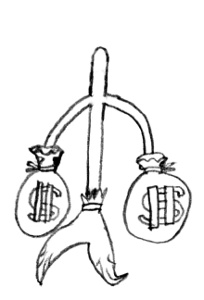The Sorcerer's Apprentice

Die ich rief, die Geister, werd ich nun nicht los.
(The spirits that I summoned, I now cannot dismiss.)
— J.W. Goethe, Der Zauberlehrling
There's a certain poetry to the history of life. In the beginning there was nothing, or, more accurately, no goal-directed behaviour. Eventually, by pure chance as far as we can tell, the first unit of replication appeared. It was ludicrously simple, almost definitionally the simplest thing that could copy itself. And as it replicated it sometimes replicated imperfectly, and the imperfect copies that replicated faster and better beat the imperfect copies that didn't. Life!
The central tenet of Dawkins' The Selfish Gene is that this unit of replication, what eventually became the gene, cannot by definition care about anything but itself. It is a replicator, so it replicates. Anything else that it does must be in the service of this replication, up to and including destroying the environment around it, including both the natural world and the body that the genes inhabit. Anything that isn't a gene is expendable in the name of replication.
But, and here's the poetic bit, at some point these genes made a terrible mistake: they created a new replicator. The meme is a unit of replication for ideas. An idea spreads from person to person through culture and imitation, mutates through miscommunication and deliberate alteration, and is selected on the basis of its interestingness and usefulness. Our ancestors' genes developed the capability to spread memes because they could help us survive, but the end result was that genes became mere hosts for these new units of replication, which could replicate and adapt much more quickly than genes and thus begin to dominate them.
Any time a person chooses to use contraception because it seems like a good idea, any time they choose to die for an ideological cause, any time culture or ideas reduce their ability to survive and reproduce, the memes have beaten the genes. There are open questions about why human brains are so large that they cause women to die in childbirth, require children to be born immature, and use an enormous amount of our precious bodily resources. Perhaps there was some early meme that led people with large brains to reproduce more, or ostracised or killed those with smaller brains. The selfish memes would do this not for our benefit, but for their own.
Susan Blackmore suggests that we may be on the brink of unleashing a third replicator, what she calls a teme, or technological meme. Memes are currently limited in how much they can replicate at our expense; much like any parasitic relationship, you don't want to kill the host. But if memes could host themselves somewhere other than our brains, they would no longer need us. Without even realising it, we may be building these new hosts in the form of increasingly powerful technology.
However, I think you don't need to look that far to see the third replicator; it's already been here for hundreds of years. What else makes copies of itself, splits and recombines, has an internal code that dictates its behaviour, and faces selection pressure from scarce resources and rivals? A corporation! The behaviour of a corporation is dictated by its mission, culture, standard practices, and explicit rules. It is essentially a vehicle for collecting and incubating this specific subset of ideas and turning them into money. It is selected by its ability to do this.
Since it's customary to invent names for these sorts of things, I will call the unit of economic replication an economeme. Economemes are propagated indirectly by the exchange of employees between companies, and directly by mergers, acquisitions and spin-offs. A corporation competes for economic resources, and the corporations with the best economemes grow large and produce subsidiaries which begin to develop independently, sometimes contributing economemes back to the parent company, and other times splitting off into entirely new corporations.
It should be little wonder that, in the cases where our needs as people conflict with the needs of corporations, people rarely win. Corporations are incredibly powerful economemetic engines capable of far greater impact than any individual person, with generation times measured in years rather than decades. With this much on offer, the best and brightest memes of our age are those that can make their way into the corporate world as economemes. In fact, it's not a stretch to say that this meme-optimised environment was the goal of making corporations in the first place.
Crucially, although corporations are currently implemented on top of people, they do not require people, and people are incidental to their operation. You can swap out all the people in a corporation one by one and it will keep doing what it does, such that no person can reasonably be said to control it. People are more like cells in the body than the DNA dictating its makeup. Even that need may be temporary; modern corporations rely heavily on automation, and it is only a matter of time until the technological meme runs headlong into the economeme in the form of a fully automated corporation.
When that happens, there will be some question as to whether people really have a seat at the replicator table at all. Faced with our most powerful memes collected in sophisticated corporate vehicles that can operate without us, I'm not sure how we could compete. Like the purely genetic creatures that came before us and are now mostly dead, domesticated or in zoos, we may end up left in the evolutionary dust.